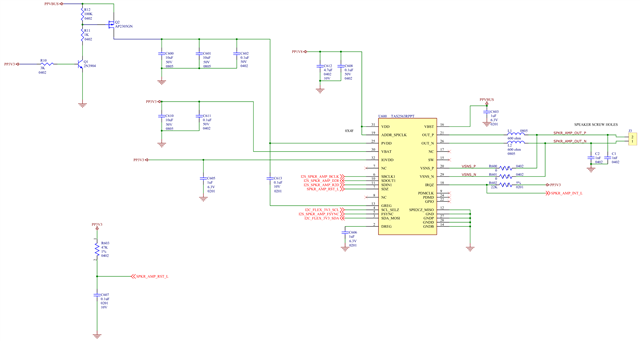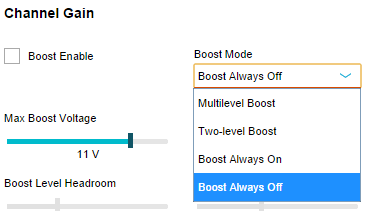Tool/software:
Hello!
We have been using TAS2563 in our design, integrated with the Linux driver.
Whenever we stop playing audio, we can hear a "plop" sound at the end.
This happens in the following cases:
- Playing audio, then stop
- Playing silence, then stop
- Playing audio, then muting (Chn0B0x00P0x00A0x02: 0x01)
- Playing audio, then issuing Software Shutdown ((Chn0B0x00P0x00A0x02: 0x02)
Also, if the volume is lowered down modifying the AMP_LEVEL bits of Chn0B0x00P0x00A0x03 you can hear a "plop".
In this case, the magnitude of the plop is proportional to the jump (example: 0x10 to 0x01 > 0x10 to 0x0F).
Can you help me identify if there is a software option to decrease this noise or if it's hardware related?
You can find our schematics here:

And register dump here:
addr: 0x4f Chn0B0x00P0x00R0x00:0x00 Chn0B0x00P0x00R0x01:0x00 Chn0B0x00P0x00R0x02:0x0e Chn0B0x00P0x00R0x03:0x20 Chn0B0x00P0x00R0x04:0xc6 Chn0B0x00P0x00R0x05:0x22 Chn0B0x00P0x00R0x06:0x09 Chn0B0x00P0x00R0x07:0x02 Chn0B0x00P0x00R0x08:0x3e Chn0B0x00P0x00R0x09:0x10 Chn0B0x00P0x00R0x0a:0xf1 Chn0B0x00P0x00R0x0b:0x46 Chn0B0x00P0x00R0x0c:0x44 Chn0B0x00P0x00R0x0d:0x04 Chn0B0x00P0x00R0x0e:0x05 Chn0B0x00P0x00R0x0f:0x06 Chn0B0x00P0x00R0x10:0x07 Chn0B0x00P0x00R0x11:0x7f Chn0B0x00P0x00R0x12:0x12 Chn0B0x00P0x00R0x13:0x76 Chn0B0x00P0x00R0x14:0x00 Chn0B0x00P0x00R0x15:0x2e Chn0B0x00P0x00R0x16:0x60 Chn0B0x00P0x00R0x17:0x0e Chn0B0x00P0x00R0x18:0x0c Chn0B0x00P0x00R0x19:0x00 Chn0B0x00P0x00R0x1a:0xfc Chn0B0x00P0x00R0x1b:0xa6 Chn0B0x00P0x00R0x1c:0xdf Chn0B0x00P0x00R0x1d:0xff Chn0B0x00P0x00R0x1e:0xff Chn0B0x00P0x00R0x1f:0x00 Chn0B0x00P0x00R0x20:0x00 Chn0B0x00P0x00R0x21:0x00 Chn0B0x00P0x00R0x22:0x80 Chn0B0x00P0x00R0x23:0x00 Chn0B0x00P0x00R0x24:0x04 Chn0B0x00P0x00R0x25:0x00 Chn0B0x00P0x00R0x26:0x91 Chn0B0x00P0x00R0x27:0x80 Chn0B0x00P0x00R0x28:0x00 Chn0B0x00P0x00R0x29:0xdc Chn0B0x00P0x00R0x2a:0x35 Chn0B0x00P0x00R0x2b:0x90 Chn0B0x00P0x00R0x2c:0x7b Chn0B0x00P0x00R0x2d:0x8e Chn0B0x00P0x00R0x2e:0x40 Chn0B0x00P0x00R0x2f:0xa4 Chn0B0x00P0x00R0x30:0x99 Chn0B0x00P0x00R0x31:0x40 Chn0B0x00P0x00R0x32:0x81 Chn0B0x00P0x00R0x33:0x94 Chn0B0x00P0x00R0x34:0x4b Chn0B0x00P0x00R0x35:0xa4 Chn0B0x00P0x00R0x36:0x0c Chn0B0x00P0x00R0x37:0x00 Chn0B0x00P0x00R0x38:0x21 Chn0B0x00P0x00R0x39:0x0c Chn0B0x00P0x00R0x3a:0xbe Chn0B0x00P0x00R0x3b:0x58 Chn0B0x00P0x00R0x3c:0x58 Chn0B0x00P0x00R0x3d:0x08 Chn0B0x00P0x00R0x3e:0x00 Chn0B0x00P0x00R0x3f:0x00 Chn0B0x00P0x00R0x40:0x36 Chn0B0x00P0x00R0x41:0x41 Chn0B0x00P0x00R0x42:0xd8 Chn0B0x00P0x00R0x43:0xc0 Chn0B0x00P0x00R0x44:0x10 Chn0B0x00P0x00R0x45:0x21 Chn0B0x00P0x00R0x46:0x00 Chn0B0x00P0x00R0x47:0x90 Chn0B0x00P0x00R0x48:0x6c Chn0B0x00P0x00R0x49:0x90 Chn0B0x00P0x00R0x4a:0x40 Chn0B0x00P0x00R0x4b:0x00 Chn0B0x00P0x00R0x4c:0x00 Chn0B0x00P0x00R0x4d:0x00 Chn0B0x00P0x00R0x4e:0x00 Chn0B0x00P0x00R0x4f:0x00 Chn0B0x00P0x00R0x50:0x00 Chn0B0x00P0x00R0x51:0x00 Chn0B0x00P0x00R0x52:0x00 Chn0B0x00P0x00R0x53:0x00 Chn0B0x00P0x00R0x54:0x00 Chn0B0x00P0x00R0x55:0x00 Chn0B0x00P0x00R0x56:0x00 Chn0B0x00P0x00R0x57:0x00 Chn0B0x00P0x00R0x58:0x00 Chn0B0x00P0x00R0x59:0x00 Chn0B0x00P0x00R0x5a:0x00 Chn0B0x00P0x00R0x5b:0x00 Chn0B0x00P0x00R0x5c:0x00 Chn0B0x00P0x00R0x5d:0x00 Chn0B0x00P0x00R0x5e:0x00 Chn0B0x00P0x00R0x5f:0x00 Chn0B0x00P0x00R0x60:0x00 Chn0B0x00P0x00R0x61:0x00 Chn0B0x00P0x00R0x62:0x00 Chn0B0x00P0x00R0x63:0x00 Chn0B0x00P0x00R0x64:0x00 Chn0B0x00P0x00R0x65:0x00 Chn0B0x00P0x00R0x66:0x00 Chn0B0x00P0x00R0x67:0x00 Chn0B0x00P0x00R0x68:0x00 Chn0B0x00P0x00R0x69:0x00 Chn0B0x00P0x00R0x6a:0x00 Chn0B0x00P0x00R0x6b:0x00 Chn0B0x00P0x00R0x6c:0x00 Chn0B0x00P0x00R0x6d:0x00 Chn0B0x00P0x00R0x6e:0x00 Chn0B0x00P0x00R0x6f:0x00 Chn0B0x00P0x00R0x70:0x00 Chn0B0x00P0x00R0x71:0x00 Chn0B0x00P0x00R0x72:0x00 Chn0B0x00P0x00R0x73:0xf0 Chn0B0x00P0x00R0x74:0x00 Chn0B0x00P0x00R0x75:0x0f Chn0B0x00P0x00R0x76:0x00 Chn0B0x00P0x00R0x77:0x00 Chn0B0x00P0x00R0x78:0x80 Chn0B0x00P0x00R0x79:0x00 Chn0B0x00P0x00R0x7a:0x00 Chn0B0x00P0x00R0x7b:0x00 Chn0B0x00P0x00R0x7c:0x00 Chn0B0x00P0x00R0x7d:0x10 Chn0B0x00P0x00R0x7e:0x23 Chn0B0x00P0x00R0x7f:0x00 == == == caught smartpa reg end == == ==




